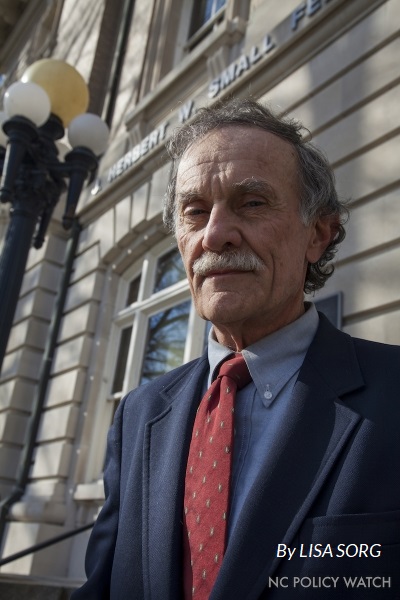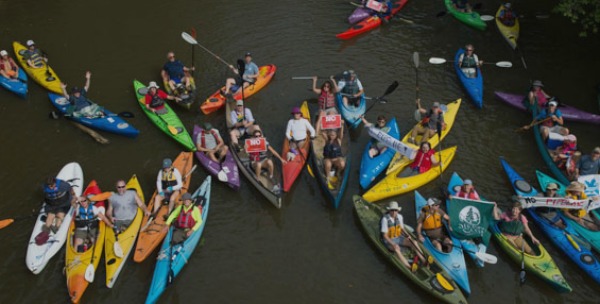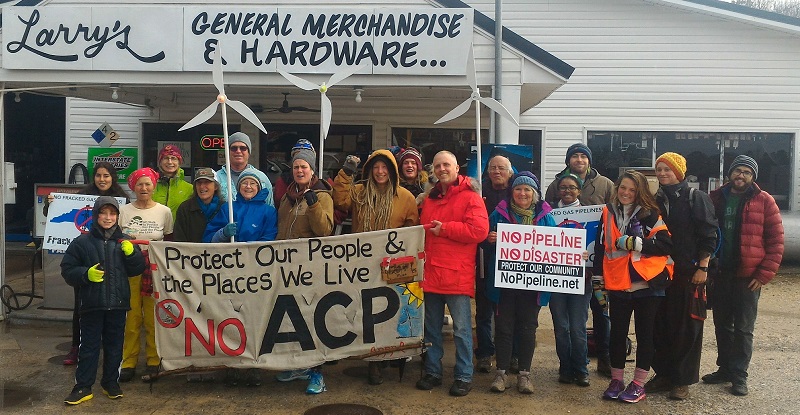By Rachita Gowdu
Stanback Fellow
May 21, 2014. It's a day that is burned into Marvin Winstead’s memory.
It was on this day more than six years ago that he received a letter from Dominion Transmission, a subsidiary of Dominion Energy, advising that his land was in the proposed path of a major natural gas pipeline from West Virginia.
 Winstead's home is not just where he lives and farms. It's the place where his parents settled in eastern North Carolina after their marriage in 1949 to raise a family and live out their lives. The influence of generations is evident: A tree on the border of the property was once earmarked by his father to cut down, but his mother objected. It stands today as a century-old artifact of the land’s - and family's - history, one that Winstead is unwilling to sacrifice.
Winstead's home is not just where he lives and farms. It's the place where his parents settled in eastern North Carolina after their marriage in 1949 to raise a family and live out their lives. The influence of generations is evident: A tree on the border of the property was once earmarked by his father to cut down, but his mother objected. It stands today as a century-old artifact of the land’s - and family's - history, one that Winstead is unwilling to sacrifice.
“It’s fighting on principle. I know that one day nature is going to take this tree away from me but I refused to sit by and watch someone take it away before then," Winstead says.
The Atlantic Coast Pipeline (ACP) was to be a nearly 600-mile natural gas pipeline spanning West Virginia, Virginia, and North Carolina. Touted as a way of revitalizing eastern North Carolina’s economy by the project's two majority stakeholders, Dominion Resources and Duke Energy, the ACP was pitched as a way of providing the region with more gas and resources. Along its proposed path were hundreds of landowners, one of whom was Winstead.
He faced land agent after land agent who made promises about the safety of the pipeline, even as it was rerouted from crossing the borders of his land to go completely across his property.
“The company kept saying that this thing wouldn’t blow up,” Winston says. “But they didn’t have to live less than 300 feet from this pipeline.”
After receiving the letter, Winstead started knocking on doors and reaching out to county officials before ending up in the Nash County assistant county manager’s office. According to Winstead, county officials hadn’t been contacted by Dominion and were only hearing about it from his request.
“If you weren’t a landowner, you didn’t pay that much attention to this stuff," he says.
So he started working to change that. Winstead became involved in organizations across the region such as the Tar River Land Conservancy, Tar-Pamlico Riverkeeper, and the Medoc Group of the Sierra Club to plan demonstrations and actions. He got in contact with Kelly Martin, the director of the Sierra Club's Beyond Dirty Fuels Initiative, a national program that works with grassroots partners to stop or delay proposed oil and gas projects across the country. In recent years, Caroline Hansley, an organizer with Beyond Dirty Fuels, was based in North Carolina to help.
 They organized a canoe and kayak trip down the Tar River (pictured) and floated over spots where Dominion planned to put the pipeline under the water. Winstead was also involved in coordinating a Pipeline Awareness walk (pictured lower), where opponents walked part of the proposed route of the pipeline, starting at Red Oak's Ennis Park and concluding at the Nash County Courthouse.
They organized a canoe and kayak trip down the Tar River (pictured) and floated over spots where Dominion planned to put the pipeline under the water. Winstead was also involved in coordinating a Pipeline Awareness walk (pictured lower), where opponents walked part of the proposed route of the pipeline, starting at Red Oak's Ennis Park and concluding at the Nash County Courthouse.
Through it all, the Sierra Club - from local volunteers to Chapter staff to Club campaign organizers - was a critical part of the effort's success, Winstead says.
“If the Sierra Club had not made the decision to fight the pipeline, I don’t know if we would have gotten the same results," he says.
Directly impacted people, such as landowners and BIPOC communities in the pipeline's path, helped lead work at the Group level while the state Chapter helped with lobbying efforts over permits. The Virginia Chapter was integral in frontline legal cases, as well as working with the N.C. Chapter in political advocacy and establishing a framework for organizing efforts.
 The national Sierra Club, Hansley says, showed up not only for organization but as a legal entity, taking part in “more than seven lawsuits against the ACP that were part of the linchpin that stopped this pipeline.”
The national Sierra Club, Hansley says, showed up not only for organization but as a legal entity, taking part in “more than seven lawsuits against the ACP that were part of the linchpin that stopped this pipeline.”
While campaigns such as the Beyond Dirty Fuels are relatively new in the North Carolina Chapter’s 50-year history, they offer a nuanced way of marshaling resources behind issues that cross state borders. The success of the ACP opposition shows the power of rallying local Groups and Chapters on a single, shared cause with the strength of the full Club behind them. Looking forward, campaigns such as this are a model to encourage and sustain partnerships for current and future regional issues.
This team effort reached its peak on July 5, when Duke and Dominion announced they were scrapping the project over its ballooning cost - a cost that ballooned substantially thanks to the dogged resistance.
Winstead says it's important that people who share a common concern support one another in tangible, lasting ways. In the future, he hopes to see more of the coalition-building that led to the demise of the ACP.
“When fighting the next pipeline coming to North Carolina, we can’t just talk about it. We must do more actions,” Winstead says.
Hansley agrees that this success happened thanks to the power of many people unified and energized by a common goal.
“[The Club] did it differently because we followed the lead of the people who would be most impacted by this pipeline,” Hansley says, “We get to these victories by learning from these moments; we keep what works and get rid of what doesn’t work.”